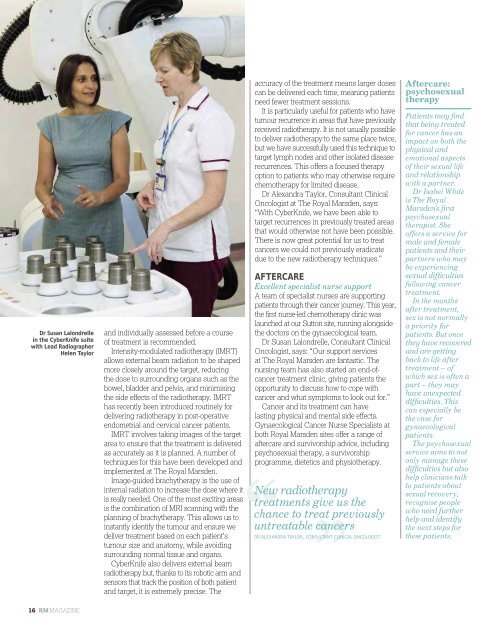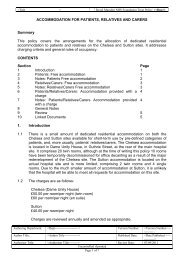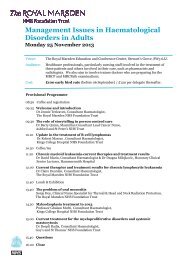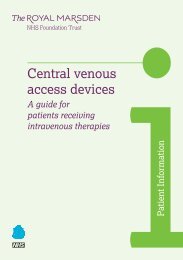RM Magazine - autumn 2012 - The Royal Marsden
RM Magazine - autumn 2012 - The Royal Marsden
RM Magazine - autumn 2012 - The Royal Marsden
You also want an ePaper? Increase the reach of your titles
YUMPU automatically turns print PDFs into web optimized ePapers that Google loves.
Cancer in focus<br />
Dr Susan Lalondrelle<br />
in the cyberKnife suite<br />
with Lead radiographer<br />
Helen taylor<br />
and individually assessed before a course<br />
of treatment is recommended.<br />
intensity-modulated radiotherapy (imRT)<br />
allows external beam radiation to be shaped<br />
more closely around the target, reducing<br />
the dose to surrounding organs such as the<br />
bowel, bladder and pelvis, and minimising<br />
the side effects of the radiotherapy. imRT<br />
has recently been introduced routinely for<br />
delivering radiotherapy in post-operative<br />
endometrial and cervical cancer patients.<br />
imRT involves taking images of the target<br />
area to ensure that the treatment is delivered<br />
as accurately as it is planned. a number of<br />
techniques for this have been developed and<br />
implemented at <strong>The</strong> <strong>Royal</strong> marsden.<br />
image-guided brachytherapy is the use of<br />
internal radiation to increase the dose where it<br />
is really needed. One of the most exciting areas<br />
is the combination of mRi scanning with the<br />
planning of brachytherapy. This allows us to<br />
instantly identify the tumour and ensure we<br />
deliver treatment based on each patient’s<br />
tumour size and anatomy, while avoiding<br />
surrounding normal tissue and organs.<br />
CyberKnife also delivers external beam<br />
radiotherapy but, thanks to its robotic arm and<br />
sensors that track the position of both patient<br />
and target, it is extremely precise. <strong>The</strong><br />
accuracy of the treatment means larger doses<br />
can be delivered each time, meaning patients<br />
need fewer treatment sessions.<br />
it is particularly useful for patients who have<br />
tumour recurrence in areas that have previously<br />
received radiotherapy. it is not usually possible<br />
to deliver radiotherapy to the same place twice,<br />
but we have successfully used this technique to<br />
target lymph nodes and other isolated disease<br />
recurrences. This offers a focused therapy<br />
option to patients who may otherwise require<br />
chemotherapy for limited disease.<br />
Dr alexandra Taylor, Consultant Clinical<br />
Oncologist at <strong>The</strong> <strong>Royal</strong> marsden, says:<br />
“With CyberKnife, we have been able to<br />
target recurrences in previously treated areas<br />
that would otherwise not have been possible.<br />
<strong>The</strong>re is now great potential for us to treat<br />
cancers we could not previously eradicate<br />
due to the new radiotherapy techniques.”<br />
aftercare<br />
Excellent specialist nurse support<br />
a team of specialist nurses are supporting<br />
patients through their cancer journey. This year,<br />
the first nurse-led chemotherapy clinic was<br />
launched at our Sutton site, running alongside<br />
the doctors on the gynaecological team.<br />
Dr Susan Lalondrelle, Consultant Clinical<br />
Oncologist, says: “Our support services<br />
at <strong>The</strong> <strong>Royal</strong> marsden are fantastic. <strong>The</strong><br />
nursing team has also started an end-ofcancer<br />
treatment clinic, giving patients the<br />
opportunity to discuss how to cope with<br />
cancer and what symptoms to look out for.”<br />
Cancer and its treatment can have<br />
lasting physical and mental side effects.<br />
gynaecological Cancer nurse Specialists at<br />
both <strong>Royal</strong> marsden sites offer a range of<br />
aftercare and survivorship advice, including<br />
psychosexual therapy, a survivorship<br />
programme, dietetics and physiotherapy.<br />
New radiotherapy<br />
treatments give us the<br />
chance to treat previously<br />
untreatable cancers<br />
DR alexanDRa tayloR, Consultant CliniCal onCologist<br />
Aftercare:<br />
psychosexual<br />
therapy<br />
Patients may find<br />
that being treated<br />
for cancer has an<br />
impact on both the<br />
physical and<br />
emotional aspects<br />
of their sexual life<br />
and relationship<br />
with a partner.<br />
Dr Isabel White<br />
is <strong>The</strong> <strong>Royal</strong><br />
<strong>Marsden</strong>’s first<br />
psychosexual<br />
therapist. She<br />
offers a service for<br />
male and female<br />
patients and their<br />
partners who may<br />
be experiencing<br />
sexual difficulties<br />
following cancer<br />
treatment.<br />
In the months<br />
after treatment,<br />
sex is not normally<br />
a priority for<br />
patients. But once<br />
they have recovered<br />
and are getting<br />
back to life after<br />
treatment – of<br />
which sex is often a<br />
part – they may<br />
have unexpected<br />
difficulties. This<br />
can especially be<br />
the case for<br />
gynaecological<br />
patients.<br />
<strong>The</strong> psychosexual<br />
service aims to not<br />
only manage these<br />
difficulties but also<br />
help clinicians talk<br />
to patients about<br />
sexual recovery,<br />
recognise people<br />
who need further<br />
help and identify<br />
the next steps for<br />
these patients.<br />
16 <strong>RM</strong> magazine

















